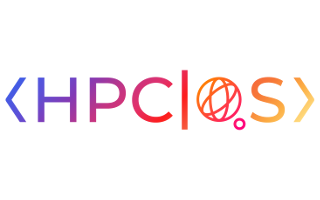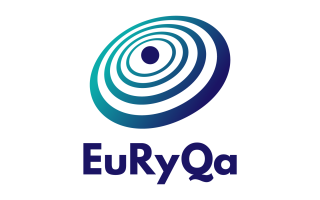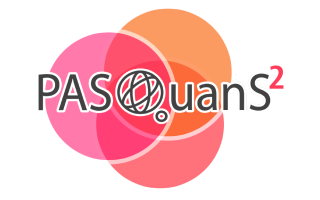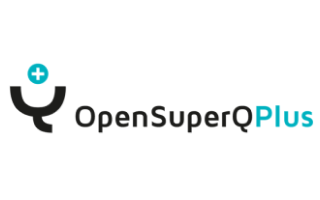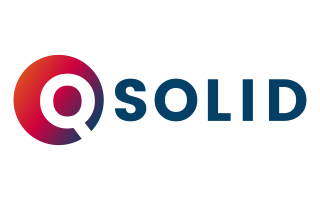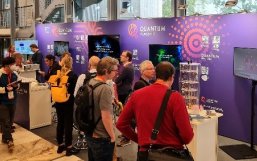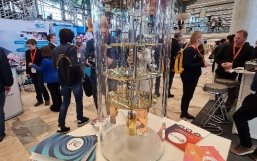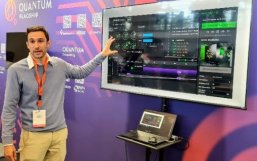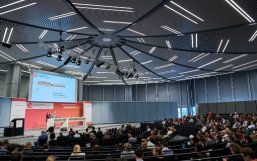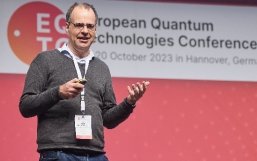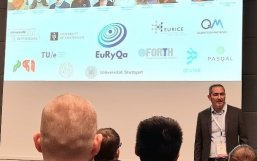Synergies Among EU Quantum Projects at the European Quantum Technologies Conference 2023 in Hanover
The European Quantum Technologies Conference 2023 (EQTC 2023), organised by Quantum Valley Lower Saxony, took place in Hanover from 16 to 20 October. The event brings together the most important European research and innovation networks every two years under the umbrella of the Quantum Flagship. As the largest quantum event of its kind, EQTC celebrates breakthroughs, highlights the pioneering work of European organisations and connects the dots within the community. This year, almost 700 stakeholders from science, politics, industry, start-ups and young talents met on site, making it an excellent platform to present our quantum projects HPCQS, EuRyQa, PASQuanS2, OpenSuperQPlus and QSolid.
Quantum Flagship Initiative Activities
The Quantum Flagship Initiative booth served as a central point of contact and source of information about the European Quantum Ecosystem. Thematically divided into the research fields of Quantum Simulation and Quantum Computing, we used this platform to present our activities within the EURICE Quantum Innovation Cluster, namely the projects HPCQS, EuRyQa and PASQuanS2 (simulation) as well as OpenSuperQPlus and QSolid (computing) with project films, print and digital information material.
PASQAL – A European Success Story
At the Quantum Flagship booth, we were also able to offer another highlight for interested visitors: PASQAL gave a live demonstration of its own quantum processor and software Pulser. The company is a European success story. PASQAL was founded as a spin-off from Institut d'Optique/Université Paris-Saclay and has received funding from different European programmes including EIC. EURICE collaborates with PASQAL in EuRyQa and PASQuanS2, also the company is the provider of the quantum simulators in HPCQS. The project is working on an open European federated hybrid High Performance Computing-Quantum Simulation infrastructure and has the first two customers for PASQAL's 100+-qubit quantum simulator. The device will soon be set up at sites in France and Germany. Several industrial partners from various fields have already tested first practical applications of the technology for the development of more efficient drugs, more efficient electricity consumption, and competitive advantage in risk management – with promising results.
Industry Partners at EQTC
Many partner companies involved in our quantum technology projects had their own booths on site the EQTC. They covered a broad range both in terms of their position in the value chain as well as in terms of the product range they offer: equipment providers and software developers, just to name a few. Qruise is a software company for machine learning. The start-up's collaboration with EURICE began with the predecessor project of OpenSuperQPlus. Two years ago, Qruise started as a spin-off of the OpenSuperQ project leader Forschungszentrum Jülich. Since then, we have been working successfully with the company on almost all of our quantum projects. Our PASQuanS2 project also featured prominently at the EQTC with industrial partners such as Alpine Quantum Technologies and Vexlum Ltd (start-ups), as well as the established company TOPTICA Photonics. QuantWare is another start-up that has been on board since the continuation of OpenSuperQPlus and presented its product portfolio at the conference.
Conference Sessions
In addition to the nearly 40 exhibits from Quantum Flagship initiatives, companies and European research centres, the conference also featured policy-making sessions involving stakeholders from across the quantum ecosystem. This provided the perfect opportunity to discuss the current state of play, network and strengthen the community. EURICE accompanied various highlights – both our own and those of project partners – on site.
European Strategy for Quantum Technologies
Among other things, this year we worked on the communication and outreach strategy within the Strategic Research and Industry Agenda (SRIA) 2030 of the Quantum Flagship Initiative. The document will be published in December this year. Our partners Kristel Michielsen and Tommaso Calarco from Forschungszentrum Jülich, with whom we collaborate on many of our quantum projects, presented the initial results at the EQTC and discussed them with the audience. In addition, Kristel Michielsen, project coordinator of HPCQS, presented her work and expertise in the panel on the European Strategy on Quantum Computing and Simulation.
Quantum Projects at EQTC
Frank Wilhelm-Mauch, our long-standing partner in projects such as QSolid and OpenSuperQ, presented the continuation of OpenSuperQPlus as an ecosystem for superconducting qubits in Europe in a keynote speech. Another of our quantum projects was also given its own stage to present a highlight: Guido Pupillo, professor at the University of Strasbourg and coordinator of EuRyQa, showcased the latest research results from the project, which were recently published in the Nature paper 'High-fidelity gates towards error correction with neutral atoms'. Together with researchers in Princeton and Yale EuRyQa has achieved the demonstration of high-fidelity one- and two-qubit gates with neutral ytterbium atoms, and of a way to identify when errors occur in quantum computers more easily than ever before.
Shaping the Future of Quantum
EURICE is involved in shaping the future of quantum together with the coordinators of all our quantum projects – among others via our partners’ involvement in the Quantum Flagship’s Quantum Coordination Board (QCB). This also comprises our contribution to the Strategic Research and Industry Agenda (SRIA) of the Quantum Flagship Initiative.
“Exciting, but also challenging times lie ahead of the quantum community. Quantum advantage needs to be proven. Currently, suitable use cases are being worked on and have to demonstrate their value in real-life environments. Building a thriving industrial EU ecosystem requires adequate access to finance for start-up companies. There are many promising technologies and young and eager entrepreneurs around. However, they need to be given the – very often – considerable financial resources they rely on to build up their business and a customer base. To this aim, it is necessary that potential investors understand the specifics of the quantum sector and are willing to accept the risks together with the high potential,” says Corinna Hahn, lead of our Innovation Cluster 'Quantum Technologies'.
